Main Verbs, Helping Verbs and Modal Auxiliaries
What are Main and Helping Verbs?
Let us read the following sentences.

The word which represents action in Sentence 1 is brought; however, in Sentence 2,
one word alone does not represent the action. The phrase is serving functions as the verb.
When we inspect this phrase, we see it is made of two elements. One word actually carries the main idea of
the action, and the other word tells us more about the nature of the action. In the phrase, serving is the main verb.
The word is tells us more about the nature of the main action; hence, it is a helping verb.
Main Verbs
• Main verbs are words which represent the primary or main action of thesubject.
• They contain the mainmeaning.

Helping Verbs
• Helping verbs are words which support mainverbs.
• They are important to the structure ofsentences.
• They also tell us about the nature of the main verb with respect to tense andform.
• They have little or no meaning as compared to the mainverb.

Primary Helping Verbs
Primary helping verbs are helping verbs which can also function as main verbs. They can be divided into three categories.
• Be forms (progressive helping verbs):Verbs like is, are, am, was, wereare known as Be forms of
helping verbs or progressive helping verbs. They tell us that the action expressedby the main verb
is still inprogression.
• Present progressive:Rashid is writing an essay for Englishclass.
• Past progressive:Greta was complaining to me aboutGreg.
• Future progressive:His friends will be creating a ruckus in the collegelibrary.
• Have forms or perfect forms:Verbs like has, have, had are known as perfect forms of helping verbs.
They tell us that the action expressed by the main verb is finished, complete orperfected.
• Present perfect:Dr Pavlov has fed hisdog.
• Past perfect:Kavita had informed theauthorities.
• Future perfect:Bianca will have completed three years in theoffice.
• Do forms:Helping verbs like do, does, did, done are known as do forms of helping verbs.They are usedfor
• Emphasis:She does rememberyou.
• Negation:Karim didn’tcall me back aspromised.
• Forming questions: Did you park the car on the wrongside?
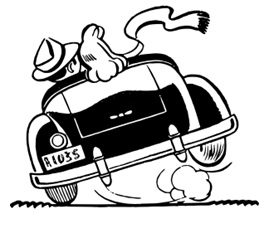
Modal Auxiliaries
• Modal auxiliaries or modal verbs are helping verbs which tell us about the modality
orintent behind the verb’sperformance.
• These modalities include permission, suggestion, ability, probability orobligation.
• Without the main verb, the auxiliary will not make sense atall.
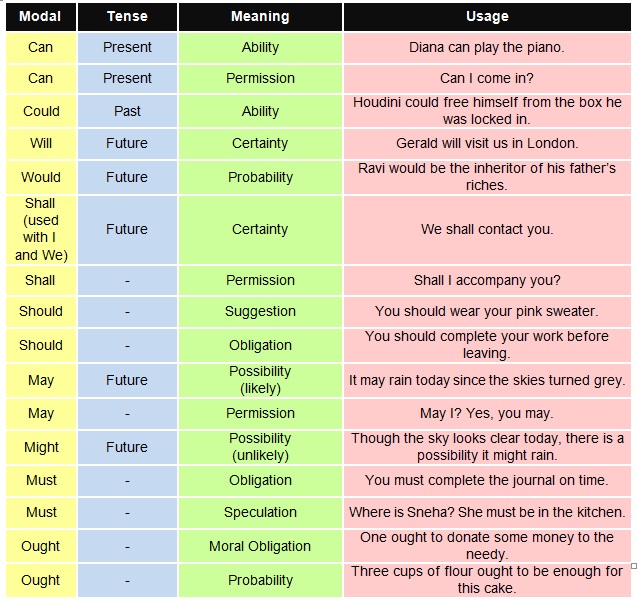
Subject-Verb Agreement, Finite and Non-Finite Verbs
Subject-Verb Agreement
What is Subject-Verb Agreement?
Read the following sentences:

In Sentence 1, the subject ‘The bear cub’ agrees with the verb crawls. In Sentence 2, the subject
The bear cubs agrees with the verb crawl. In Sentence 1, the subject is singular; hence, the verb is singular.
In Sentence 2, the subject is plural; hence, the verb is also plural.
This agreement between the subject and the verb is known as subject verb agreement or subject verb concord.
In simple words, we can say that when the subject is singular, the verb is singular; when the subject is plural,
the verb is also plural.
Let us observe more examples.

In the above examples, we can see that the subjects agree with their verbs with respect to number.
The subject of a sentence can be a noun, a pronoun or a gerund. The rules of agreement can be different for each.
Rules for Nouns
• Uncountable nouns will always agree with singularverbs.
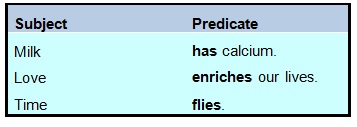
• Material nouns will also agree with singularverbs.
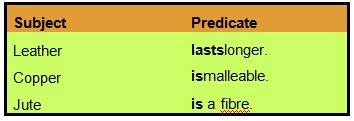
• In a collective noun phrase, the headword will agree with the verb and not the
noun whichfollows the preposition‘of’.

• However, some collective nouns will always agree with pluralverbs.
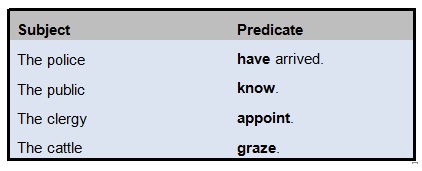
• Sometimes, it is the actions of the nouns in the collective noun which decides whether it
agrees with a singular verb or a pluralverb.
• If the actions are united, the collective noun will agree with a singularverb.

• If the actions are individualistic (each member in the group performs separately) or if there isa
disagreement or discord within the group, the collective noun will agree with a plural verb.

• If the noun is preceded by the phrase ‘a pair of’ or ‘pairs of’, the verb will agree with the headword ‘pair’ or‘pairs’.

Rules for Pronouns
• When the subject of the sentence is a pronoun, the verb agrees with the pronoun not onlyin
number but also in person.
• First person pronouns always agree with pluralverbs.
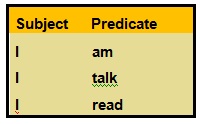
• Second person pronouns also agree with plural verbs.
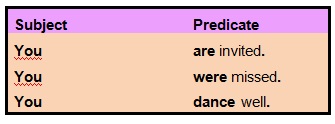
• Singular third person pronouns agree with singularverbs.
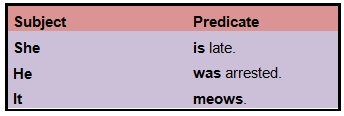
• Plural third person pronouns agree with pluralverbs.

• Indefinite pronouns take singularverbs.
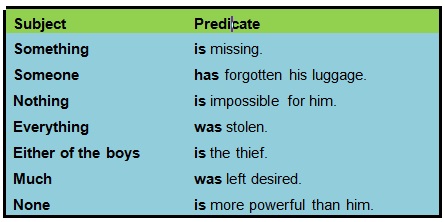
Rules for Gerunds
• Gerunds usually agree with singularverbs.

Miscellaneous Rules for Agreement
And
• Two nouns joined by the conjunction ‘and’ agree with a pluralverb.

• If there is no article with the second noun, it means both the nouns function as a single subject.
In that case, the verb is singular.

• In the above example, the subject is singular.
• This is because there is no article with the second noun‘philosopher’.
• It means the political leader is also aphilosopher.
Along with, As well as, Togetherwith
• Phrases like ‘along with’ and ‘as well as’ and ‘together with’ connect two nouns likethe conjunction‘and’.
• But the verbs in these cases will agree with the firstnoun.
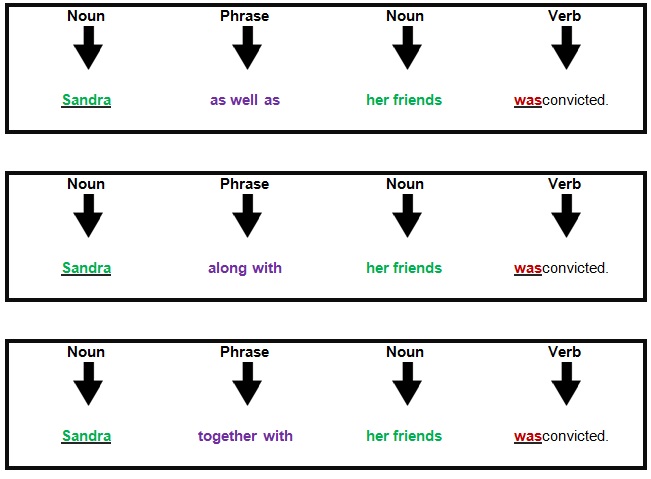
Either…or, Neither…nor
• When two nouns are connected by correlatives either…or and neither…nor, the verb
agreeswith the noun which is closest toit.
